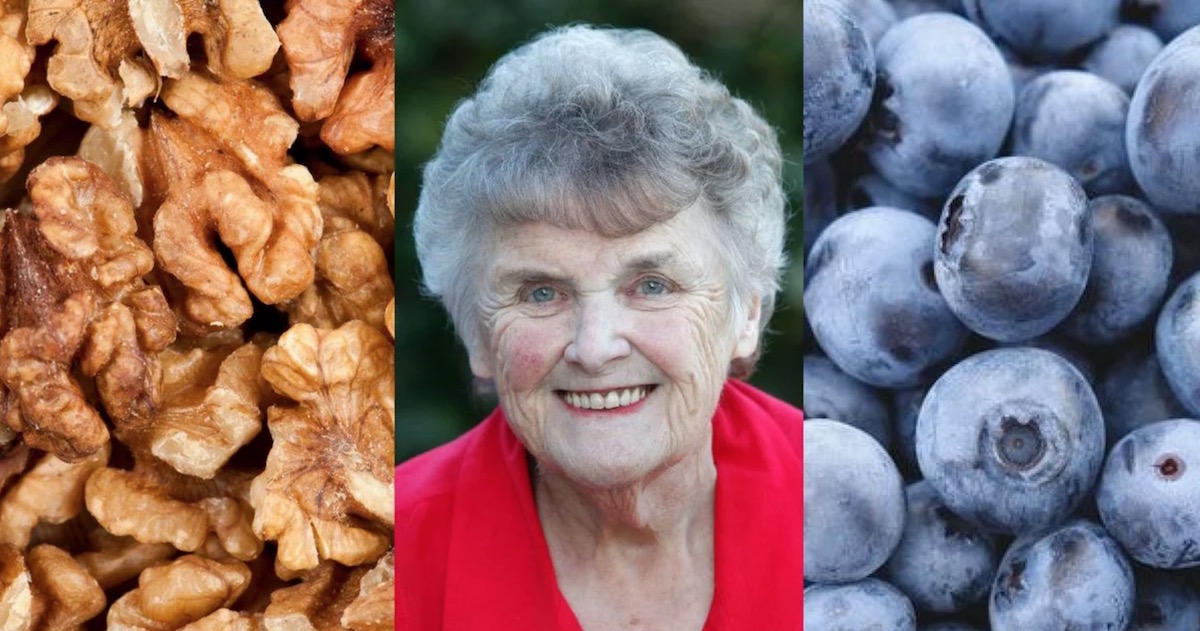Sylvia Hatzer, a 82-year-old dementia patient who could no longer recognize her own son, suddenly regained her memory after a change in diet. When his mother’s condition deteriorated to such an extent that she had to stay in hospital for her own safety, Mark Hatzer believed that he had lost his second parent. Sylvia, had even called the police and accused the nurses who took care of kidnapping. Thanks to a conscious change in diet, Sylvia’s condition unexpectedly improved. Now her prescription is even recommended by the Alzheimer’s Society. In addition to blueberries and walnuts, she also began to integrate broccoli, kale and spinach, sunflower seeds, green tea, oats, sweet potatoes and, as a treat, dark chocolate with a high cocoa content into her diet.
Mark, who lives in Prestwich, Greater Manchester, lost his father of a heart attack in 1987, the Manchester Evening News reported. Three years ago, he first noticed the forgetfulness of his 82-year-old mother. She suddenly had more difficulty remembering birthdays or arrangements she had made with friends. After this happened more often, she was diagnosed with Alzheimer’s in December 2016. The worsening was quite rapid. Alzheimer’s often has the side effect of epilepsy – and after a seizure and fall the following March, Sylvia was taken to North Manchester General Hospital. Here her 50-year-old son experienced the lowest point of his life when his mother did not recognize him anymore.
The doctors asked if Sylvia could be transferred because she had accused the staff of kidnapping her. Although this was not necessary in the end, it took two months before she could be released again. About a year later, Sylvia, the former telephone operator, returned home. She has largely recovered from her illness. Now she is even being used by the Alzheimer’s Society as an example to show how the disease can be significantly prevented. Today, she can remember birthdays, go to public events and manage most of her care needs by herself.
Much of the transformation is based on a diet and recipes that Mark and Sylvia have developed together, including walnuts, blueberries, and other foods that support the brain. They decided that medication was not enough, noticed that the incidence of dementia in the Mediterranean countries was much lower and copied eating habits.
Mark said: “When my mother was in hospital, she thought it was a hotel – but the worst she had ever been to. She didn’t recognize me and called the police because she thought she had been kidnapped.”
What can we learn from Sylvia’s diet plan?
(Berries, green leafy vegetables, sweet potatoes, little processed food)
–> Blueberries improve the memory!
Sylvia ate a rich diet of blueberries, blackberries and strawberries. Berries are flavonoids known for their antioxidant and anti-inflammatory properties. In 2006, researchers discovered that blueberries could activate a part of the brain that controls learning and memory. However, further studies are needed. However, Sylvia seems to have already passed the “practical test”.
In addition, Sylvia’s diet was rich in green leafy vegetables such as spinach and kale. Like berries, green leaves and vegetables also contain high levels of antioxidants. The Alzheimer’s Society postulates that antioxidants can greatly help protect against the damage to brain cells associated with the disease.
Inflammation – in the form of a chemical change in the brain – is associated with Alzheimer’s disease and recognised studies confirm that a diet high in antioxidants reduces this inflammation.
Sylvia’s diet plan also included sweet potatoes and carrots. This orange vegetable is rich in beta-carotene, another antioxidant that some scientists have discovered can improve the brain and memory.
–> Did you know that astaxanthin, a little-known antioxidant, is 6000 times stronger than vitamin C?
Sylvia excluded refined sugar and sugary beverages, deep-fried foods, fast food and pastries, cakes and sweets from her diet. Foods that should be reduced to a minimum for a healthy diet.
Alzheimer’s Research UK announced that research presented at the Alzheimer’s Association International Conference 2017 highlighted four studies documenting the benefits of certain diets for healthy brain aging and reducing the risk of dementia.
Sylvia’s son hit the nail pretty hard on the head with the following statement: “Many people think that once they have been diagnosed, their lives are at over. That they will have good and bad days, but it doesn’t have to be the end. For an 82-year-old womand she’s very good, she looks 10 years younger and if you met her, you wouldn’t know she went through all that.”
It is also very important in this discussion that Alzheimer’s is attributed to aluminum deposits in the brain, among other things. In order to avoid this risk factor, it is definitely worth detoxifying the body from time to time.
Source: www.legitim.ch




